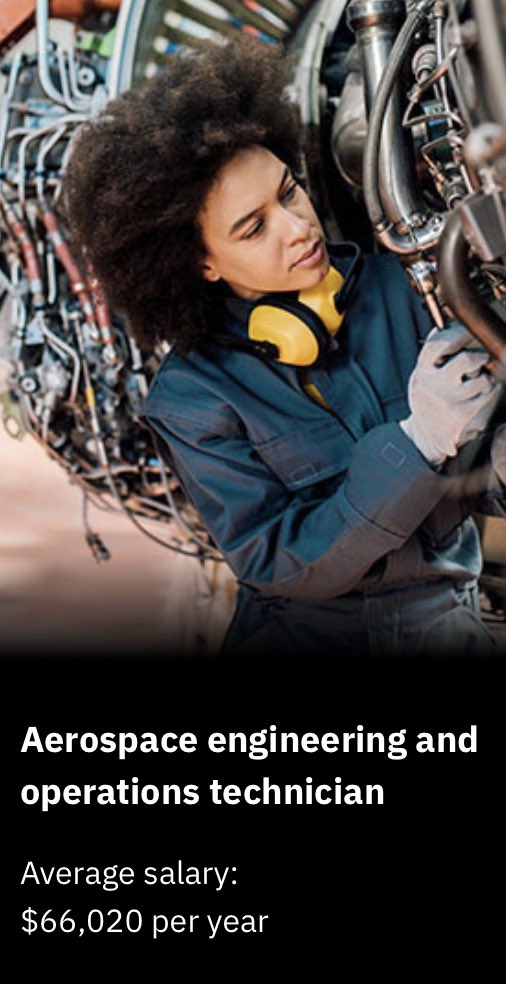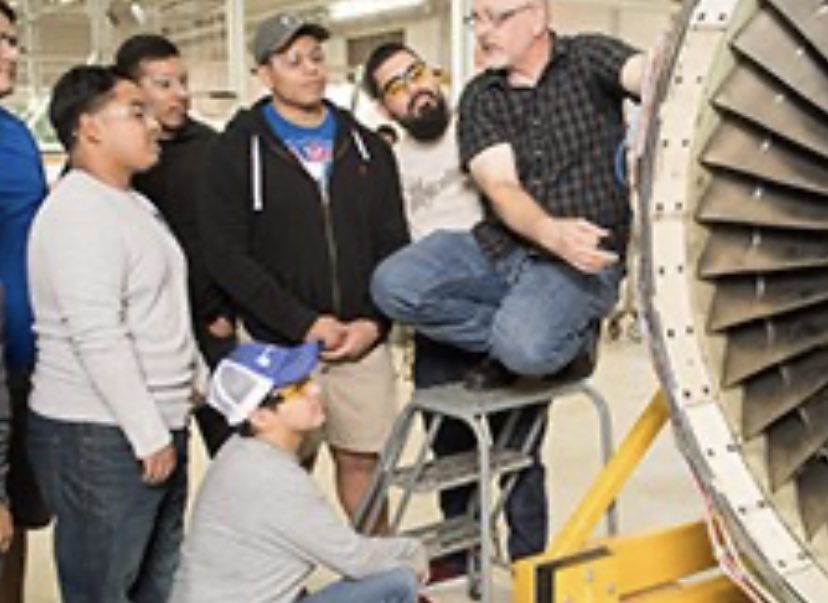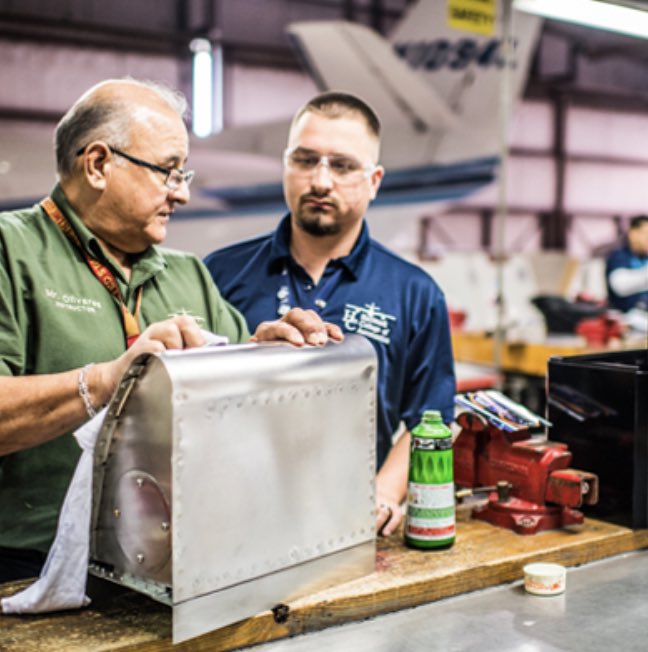I noticed some chatter last week abt aerospace engineering careers (unfortunately quite politicized) & thought it might be a good idea for a short thread w some real talk about aero career paths.
This isn’t meant to be comprehensive but just some insight from my perspective...
This isn’t meant to be comprehensive but just some insight from my perspective...
First, jobs in the aero sector ARE in high demand. This is especially true here in San Antonio (really much of Texas) and I have regular conversations with local industry where they make it clear they can’t find enough qualified applicants.
These jobs are available at many different skill levels BUT it is of course true that technical training is required for any aero-related technical position. You unfortunately can’t just roll out of bed one day and start a job in aero.
But how much training?
But how much training?
There are technician, mechanic, and maintenance jobs that are perhaps in the highest demand locally. These require certification and training you can get through a 15-24 month certificate/assoc. deg. program. You’d work on maintenance/manufacture of engines, airframes, etc.
Places like @AlamoColleges1 and @HallmarkU here in San Antonio offer these programs but there are of course many others
https://www.alamo.edu/spc/academics/programs/advanced-manufacturing-and-logistics/aircraft-technician/
https://www.alamo.edu/spc/acade... href=" https://info.hallmarkuniversity.edu/aeronautics?network=g&utm_medium=ppc&campaignid=297819844&device=m&kwcategory=b&utm_campus=Hallmark%20University&gclid=CjwKCAjwgdX4BRB_EiwAg8O8HZ0WFhOn7dwX3EPlnpDbGIhb6YZdX9h-ivkcHEViyfcGDAY9tgiXMRoCBJsQAvD_BwE&utm_content=hallmark%20aviation&utm_keyword=hallmark%20aviation&utm_hallmarksource=Adwords%20Branded%20Supplement&matchtype=p&utm_source=google&utm_campaign=b1_all_brandedsup_local">https://info.hallmarkuniversity.edu/aeronauti...
https://www.alamo.edu/spc/academics/programs/advanced-manufacturing-and-logistics/aircraft-technician/
There is certainly the bachelor’s degree in Aerospace Engineering route. 4+ yrs in a university setting. You can also go for Mechanical Eng., Electrical Eng., or other similar degrees and still get into aerospace while having broader experience to change directions.
We even just started an aerospace engineering certificate program here @UTSA @EngineeringUTSA where you can take a handful of aero classes as part of a BS degree in engineering (or with an existing degree) to beef up your CV.
One common misconception is that engineers (in particular mechanical engineers) are NOT mechanics. Nor are they technicians. And they generally don’t do maintenance or wrench-turning. They’re mostly doing design, analysis, drafting of drawings, etc (w 4-yr degree)
You can keep going for a Master’s degree in engineering—this is something that should be considered carefully. Some companies really value these degrees while others don’t care. If you go this route try to get someone (company or university PI) to pay for it.
The MS degree *can* open the door to higher-paying (or perhaps more technically advanced) entry level jobs and/or career tracks but some places it just counts the same as 2-yrs experience on the job.
There’s also the PhD route. This is definitely not for everyone & can be a pretty grueling experience. Plan for 5+ yrs post-BS degree (3+ post-MS). Do not do this self-funded. PIs have research funds to pay students and there are fellowships (although they are wildly competitive)
With the PhD you definitely have higher starting salaries although depending on career path it can be hard to economically justify the 5+ yrs of relatively high pay you missed out on post-BS. It’s not the get-rich-quick path by any means.
The appeal is that you can get on a research-driven career path. Jobs at places like NASA and national labs become a possibility. You can also conduct research and teach in a university setting although academia is not always an easy path.
So this was brief and I’ve left out a lot of points and many career options, but this is just to give an idea of *some* realistic aerospace career paths.
Feel free to jump in with comments and questions as I’m happy to help anyone considering an aero career!
Feel free to jump in with comments and questions as I’m happy to help anyone considering an aero career!

 Read on Twitter
Read on Twitter


 https://info.hallmarkuniversity.edu/aeronauti..." title="Places like @AlamoColleges1 and @HallmarkU here in San Antonio offer these programs but there are of course many others https://www.alamo.edu/spc/acade... href=" https://info.hallmarkuniversity.edu/aeronautics?network=g&utm_medium=ppc&campaignid=297819844&device=m&kwcategory=b&utm_campus=Hallmark%20University&gclid=CjwKCAjwgdX4BRB_EiwAg8O8HZ0WFhOn7dwX3EPlnpDbGIhb6YZdX9h-ivkcHEViyfcGDAY9tgiXMRoCBJsQAvD_BwE&utm_content=hallmark%20aviation&utm_keyword=hallmark%20aviation&utm_hallmarksource=Adwords%20Branded%20Supplement&matchtype=p&utm_source=google&utm_campaign=b1_all_brandedsup_local">https://info.hallmarkuniversity.edu/aeronauti..." class="img-responsive" style="max-width:100%;"/>
https://info.hallmarkuniversity.edu/aeronauti..." title="Places like @AlamoColleges1 and @HallmarkU here in San Antonio offer these programs but there are of course many others https://www.alamo.edu/spc/acade... href=" https://info.hallmarkuniversity.edu/aeronautics?network=g&utm_medium=ppc&campaignid=297819844&device=m&kwcategory=b&utm_campus=Hallmark%20University&gclid=CjwKCAjwgdX4BRB_EiwAg8O8HZ0WFhOn7dwX3EPlnpDbGIhb6YZdX9h-ivkcHEViyfcGDAY9tgiXMRoCBJsQAvD_BwE&utm_content=hallmark%20aviation&utm_keyword=hallmark%20aviation&utm_hallmarksource=Adwords%20Branded%20Supplement&matchtype=p&utm_source=google&utm_campaign=b1_all_brandedsup_local">https://info.hallmarkuniversity.edu/aeronauti..." class="img-responsive" style="max-width:100%;"/>


